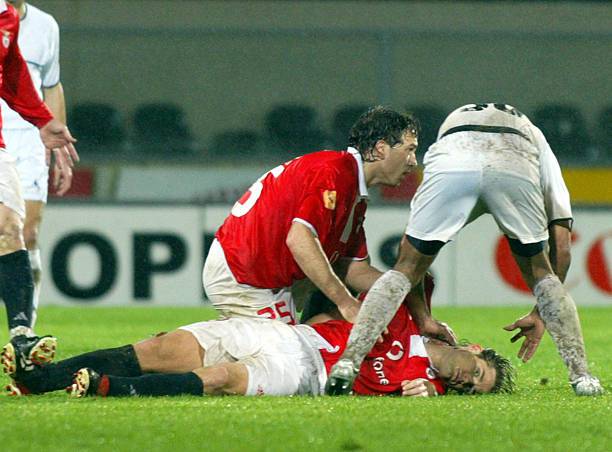The Issue Of Sudden Death In Soccer And How To Counter It

LUIS VIEIRA/AFP/Getty Images
It happened again—a young player, vivacious and promising, suddenly collapsed—on the soccer field. Just 16-years old, Mike Jones of Georgia’s Parkview High School, was not the first, second or last young man to leave the earth prematurely from the pitch, which begs the question: why does this sort of thing happen so often in soccer?
There’s something surreal about people who are alive and vigorous one minute, and unresponsive the next. It’s like they disappear in a flash, shot by an invisible enemy. Maybe you’re one of the millions of fans who has watched that haunting video, the one in which Hungary’s Miklós Fehér crumples to the ground, his light brown hair sailing upwards as he falls. It plays itself over and over again in your mind, like a desolate tune that you can’t quite shake.
How about Antonio Puerta, that Spaniard with the Greek-god looks, sitting on the turf trying to gather his bearings? A flurry of activity surrounds him as he’s whisked away on a stretcher, his distraught comrades seeing him for the last time. Then there’s Endurance Idahor, flashing a grin one moment, doubled-over on the ground the next.
So again, why soccer?
If you were to pick a doctor recommended, heart-friendly sport, you might choose golf, dancing or doubles tennis. Ho-hum. That’s not likely to happen, so what’s to be done? The medical community has proposed that sports demanding great endurance and involving a lot of stop/start action (ahem – soccer!) are particularly taxing on the heart. To offset the oxidative strain on the body, athletes involved in high-stress sports (such as soccer, racquetball and marathons) need to take in plenty of antioxidants. Are they doing that?
When you scroll down the list of those who have fallen victim to SDS (Sudden Death Syndrome), or SCD (Sudden Cardiac Death) it’s a sobering affair, and the soccer community, at least in most countries, has taken steps to hit back with prevention. FIFA not only encourages a careful heart exam for all players, but even requires their referees to undergo a heart prescreening before a World Cup event. If a ref needs to make sure his or her ticker will last through a game, how much more should those that are playing their hearts out on the field?
So, here’s the best case scenario: every single professional soccer player in the world undergoes regular heart screening and the results are read by experts. Is the problem solved? Probably not. The very action of football, that of stopping and starting abruptly, can disrupt cardiac rhythms, not to mention the occasional blow to the chest. So, unless LifeVest wearable defibrillators become part of the uniform, we need a Plan B; and not just at the professional level, where medics, defibrillators and ambulances are on hand, but at places like Parkview High School. That’s where Mike Jones, the promising young sophomore-who-played-varsity collapsed last Saturday.
What, then, is Plan B? Well, what if every player learned basic CPR? You can find out just about anything online these days, and so, why not? Can you imagine the difference that immediate intervention would make? Instead of lots of panicked people wondering what to do, frantically waving for help, what if teammates (standing close by and not needing to run from the sidelines) attempted to keep the heart pumping until a defibrillator or medic arrived? And how about those defibrillators – are they close by?
Every soccer team, elementary through high school should have an easily accessible defibrillator and someone present who knows how to use it. If you don’t think they’re necessary at the elementary level, just ask Aidan Heath’s mom. He was just seven when he died from heart complications suffered during soccer training.
Before you drop off your kids for practice, parents, why not get out of the car and ask the coach what sort of emergency response methods he or she has in place? It’s a small solution, really; but seconds are small things, and each one of them counts when the heart is giving out.
No other sport has rooted itself into the heart of the world quite like soccer. We have the tools available to at least do something to help in the moment. So why shouldn’t we?
Story Credit: https://www.soccity.net/issues-controversies/2017/08/07/sudden-death-syndrome-soccer-counter/


